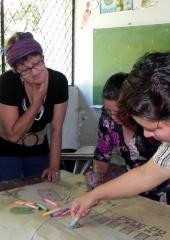This professional profile shows the minimum requirements to serve as an international UN Volunteer in community resilience for climate change and disaster risk reduction, and highlights potential assignments as well as volunteer entitlements.
In the priority area of community resilience for climate change and disaster risk reduction, the critical involvement of volunteers has been in disaster risk management, particularly by strengthening the capacity of communities to respond to and prevent disasters.
Closely linked to disaster risk reduction is the environment, and the global recognition of volunteerism’s role in environmental protection and advocacy. Volunteers facilitate transitions between emergency relief and rebuilding productive lives, and they are instrumental in leveraging and strengthening capacities in communities faced with situations of chronic vulnerability.
In the area of community resilience for climate change and disaster risk reduction, UNV’s partners have requested volunteers knowledgeable and experienced in: access to energy, food security through sustainable livelihoods, climate change adaption, community-based natural resource management, environmental risk assessment, environmental degradation prevention, sustainable biodiversity conservation climate change mitigation, strengthening community-centered sustainable development, rehabilitation and recovery and building resilient cities.

